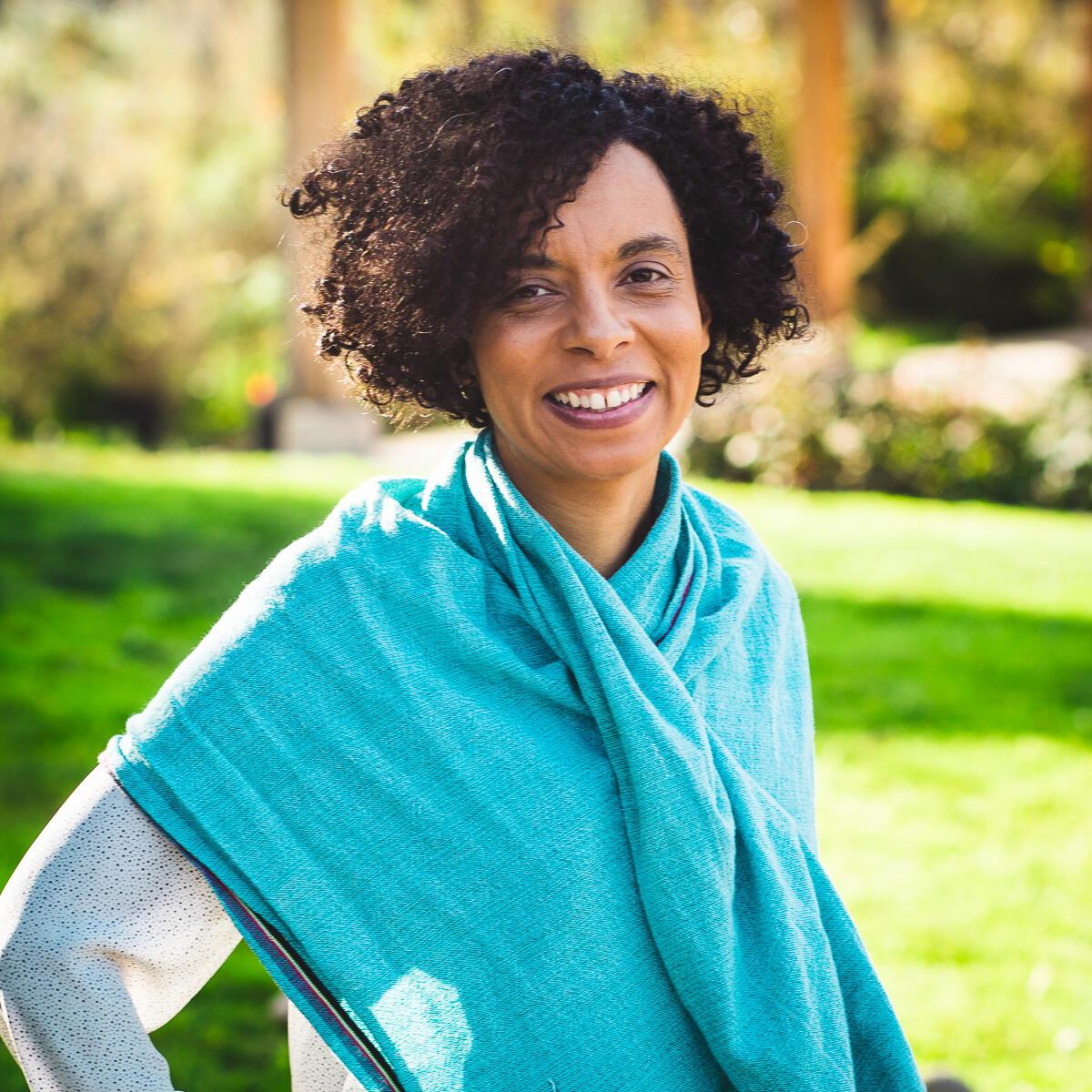
Vice President, Organizational And Food Systems Equity

Co-Director, Black Food Sovereignty Coalition
Attendees listen to the climate justice panel at Back to the Root. Photo credit: Noah Thomas
The second annual Back to the Root Conference, hosted by the Black Food Sovereignty Coalition and Mudbone Grown, welcomed 100+ BIPOC producers to convene at the Redd on Salmon Street for two days of education, inspiration, and connection.
From February 20-21, the Black Food Sovereignty Coalition and Mudbone Grown hosted the second annual Back to the Root gathering at the Redd on Salmon Street.
With support from USDA National Institute of Food and Agriculture, Back to the Root expanded in its second year into a two-day event with tours and evening gatherings that drew more than 135 people, including 100+ Black, Native American, Latinx, and other underserved POC (BIPOC) farmers, producers, and ranchers, from across California (Oakland, San Diego), Oregon, and Washington.
Back to the Root was a jam-packed gathering featuring two panel sessions (one on climate justice and another on industrial hemp and medicinal CBD); an on-point and timely keynote session from Black farmer Renard Turner of Vanguard Ranch on preparing for coming struggles (prophetic, given the conference took place a few weeks before the COVID-19 lockdowns); a variety of breakout sessions on Black land justice, starting a small farm, rural lands management, herbal medicine, seed growing, land-based healing, urban food justice, and more; and a second day with farms and food systems infrastructure tours. The successes of Back to the Root 2020 were built on the solid foundation of the 2019 conference, the first event of its kind in Oregon and the Pacific Northwest and held in partnership with Oregon State University’s Center for Small Farms.

Back to the Root 2020 was a powerful opportunity for BIPOC farmers, ranchers, educators, and advocates to gather, network, discuss experiences, build strategies, and learn about our history and our opportunities. Photo by Noah Thomas
This year’s conference opened with a land acknowledgement by one of the founders of the Black Food Sovereignty Coalition, Shantae Johnson of Mudbone Grown Farm. Shantae acknowledged that the Portland region rests on traditional village sites of the Multnomah, Kathlamet, the Willamette Tumwater, Clackamas, Wasco-Wishram, Chinook, Tualatin Kalapuya, Molalla and many other tribes who made their homes along the Columbia and Willamette Rivers. Shantae thanked the descendants of the tribes for being the original stewards and protectors of these lands since time immemorial. While acknowledging the systemic policies of genocide, relocation, and assimilation that still impact Indigenous/Native American families today, Shantae lifted up that Indigenous people are still here and are still connected to and caring for this land. She emphasized that we are honored to be guests upon these lands and committed to being good relatives.
Following the land acknowledgement, Shantae remarked that, “agriculture creates a place where the intersection of health, generational wealth, community care and land liberation meet.” The names of Black ancestors, many of whom as Shantae noted, “sowed the blueprint of regenerative resistance in our DNA,” were invoked: Malcolm X, Fannie Lou Hamer, George Washington Carver, Booker T. Whatley, and Frederick McKinley Jones. Shantae then challenged non-Black people in the audience to reach deep and dismantle white supremacy norms, lateral oppression, and anti-Blackness when it shows up in this work through compassionate, revolutionary love.
And in closing, Shantae provided a recent history to lift up the many Black leaders whose tireless efforts make Back to the Root and Black-led food and farms work in the Pacific Northwest possible. What is today a successful conference that reaches hundreds of people across the region is based on a strong foundation laid by many generations of Black organizers, farmers, and food justice activists. In 2016, community dinners and conversations around food were co-created by an intergenerational group of Black thought leaders, including Nikoya Phillips, Willie Chambers, Arthur Shavers, Rob Cato, Germaine Flentroy, Edward Hill, Shaniquia Finney, Christopher German, and Shantae Johnson.
Moreover, in 2017, Black-identified advocates from Tacoma, Seattle, and Portland formed the Pacific Northwest Black Growers group with the following purpose: “To connect Black growers in the PNW and build a strong network for collaboration, support, and inspiration recognizing that we are stronger and more effective when we work together rather than in isolation.” Rather than ask for a seat at white-led tables, these Black food system leaders mobilized to build their own. In 2018, the Black Food Sovereignty Coalition was founded as a member-based organization working in solidarity with BIPOC growers, policy makers, advocates, and educators to stabilize food systems infrastructure for marginalized communities in the Pacific Northwest.
The first Back to the Root conference in 2019 was one of the many fruits of these efforts and evolved from the foundational work of Black-led, culturally-grounded grassroots initiatives and organizations focused on food justice from Portland to Seattle. Back to the Root is a regional conference designed for and led by Black-identified farmers, ranchers, urban growers and gardeners, food producers, community health workers, entrepreneurs, educators, researchers, and advocates to network, discuss experiences, build strategies, dig into our history, and learn about opportunities.
Inspired by the energizing opening remarks, conference attendees transitioned to the morning’s Climate Justice panel. Moderated by Jamese Kwele of Ecotrust and Nyema Clark of Nurturing Roots, this panel featured Bill Beamer of the Portland Climate Action Team, Sam Baraso of the Portland Clean Energy Fund, Laquida Landford from Green In The Hood PDX, Michelle Week of Good Rain Farm, Janaira Ramirez of Portland African American Leadership Forum (PAALF) and formerly with OPAL Environmental Justice Oregon, and Tanika Thompson from Got Green Seattle.


The Climate Justice panel, featuring Tanika Thompson of Got Green Seattle, Sam Baraso of the Portland Clean Energy Fund, Bill Beamer of the Portland Climate Action Team, Laquida Landford of Green In The Hood PDX, Janaira Ramirez of PAALF, and Michelle Week of Good Rain Farm, with moderator Jamese Kwele.
Left: Eca-Etabo Wasongolo poses a question for the Climate Justice panel. Right: Climate Justice panelists Tanika Thompson, Sam Baraso, Bill Beamer, Laquida Landford, Janaira Ramirez, and Michelle Week, with moderators Jamese Kwele and Nyema Clark
The climate justice panelists talked about their work, lifted up BIPOC farmers who are on the frontlines of climate solutions, and discussed what a Green New Deal might mean for BIPOC communities. Young people and climate justice organizers have built a movement around the world to fight climate change. Across the country, advocates and organizers are demanding a Green New Deal to begin to seriously address the climate crisis. Many of the most recent Green New Deal programs would replace the fossil fuel burning infrastructure with clean and efficient energy sources, improving soil and environmental conditions, while creating millions of good-paying public-sector jobs.
Panelists and attendees alike were inspired when Tanika Thompson shared about Got Green’s community organizing efforts as a part of Seattle for a Green New Deal. This people-powered movement mobilized to get the City of Seattle to create its own Green New Deal to eliminate climate pollution by 2030, address historical injustices, and create thousands of good jobs. Tanika shared how Got Green’s canvassing efforts surfaced strong community support for fair green jobs, transit, healthcare and childcare, healthy food, and renewable energy. In August 2019, as a result of the work of Tanika and Got Green Seattle, the Seattle City Council passed the Green New Deal resolution (Res 31895) and a Green New Deal Oversight Board (CB 119604) to hold the City’s elected officials accountable for establishing Green New Deal policies.
Michelle Week of Good Rain Farm, Roberta Eagle-horse Ortiz of Wombyn’s Wellness Garden, Elisabeth Bragg of Long Hearing Farm, and Stephanie Cowherd of Ecotrust presented a standout workshop, titled “The Story of Our Land: Indigenous Land Loss and the Fight to Restore Access,” which brought awareness to the diversity of Indigenous experiences related to stolen land, while discussing specific federal policies and practices used to limit both Black and Indigenous access to and ownership of land. The panelists then shared stories about accessing, owning, and retrieving stolen land; the challenges they face as land stewards; and how federal policies still affect them today. Presenters emphasized that even today, Indigenous land continues to be stolen and fractionated, which affects Indigenous nations and communities’ economic opportunities and health and wellness.
Farmer Rohn Amegatcher presented an invigorating workshop titled, “Starting a Farm: Economics, Anatomy, and Habits,” which looked at the starting of a farm, from raw land through the first eight years, with an analysis of the economics, startup costs, and the mechanics and anatomy of assembling the farm. Rohn owns and operates Log Hollow Farms in Chehalis, Wash., which he started in 2012 as a regenerative agriculture project. Log Hollow Farms’ purpose is to grow food for the community with a food hub at its core. It serves the region as a wellness and retreat center, an educational center, a skills academy, and a maker space for creatives, bringing farming and living together in a non-traditional experiment. Rohn is now working diligently to start York College of Agriculture & Technology at Log Hollow Farms.
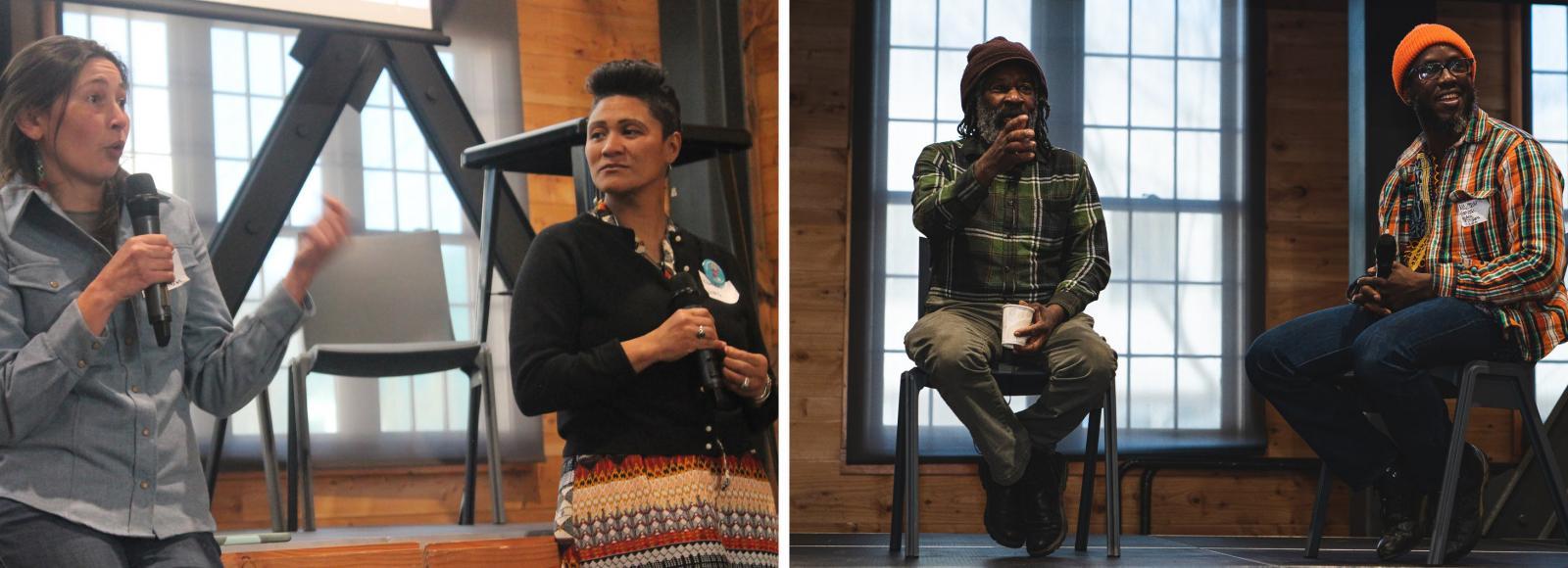
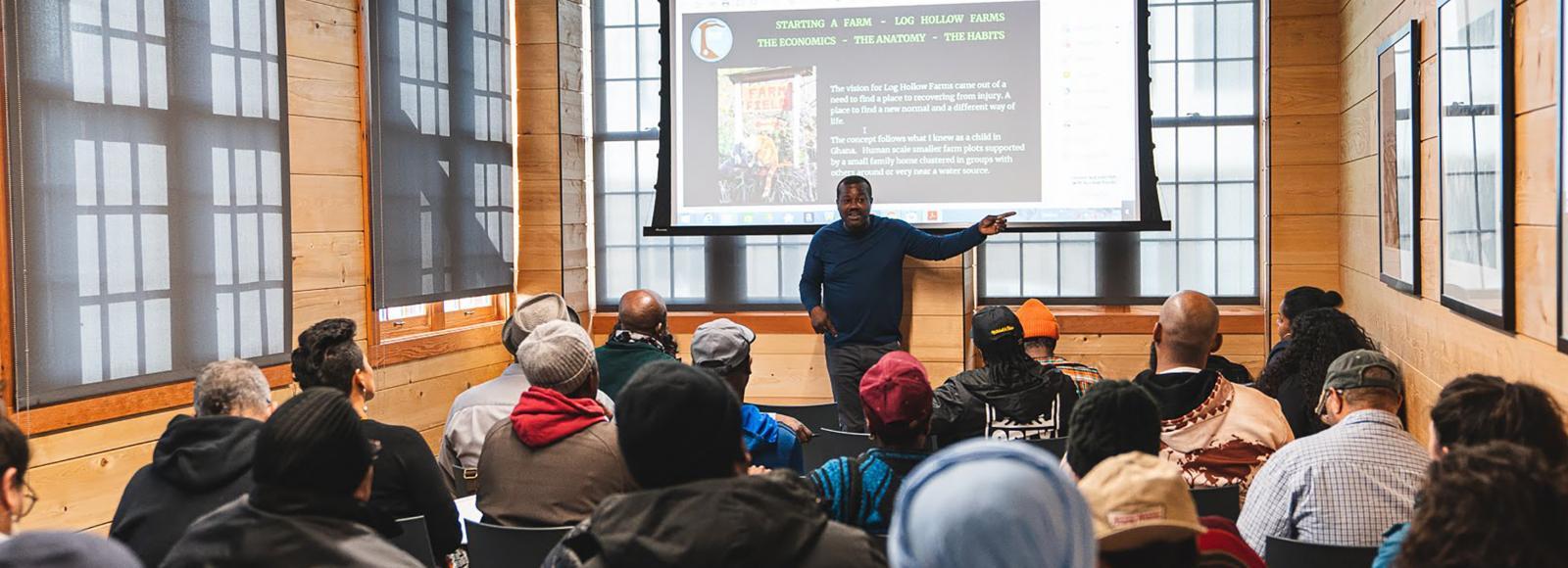
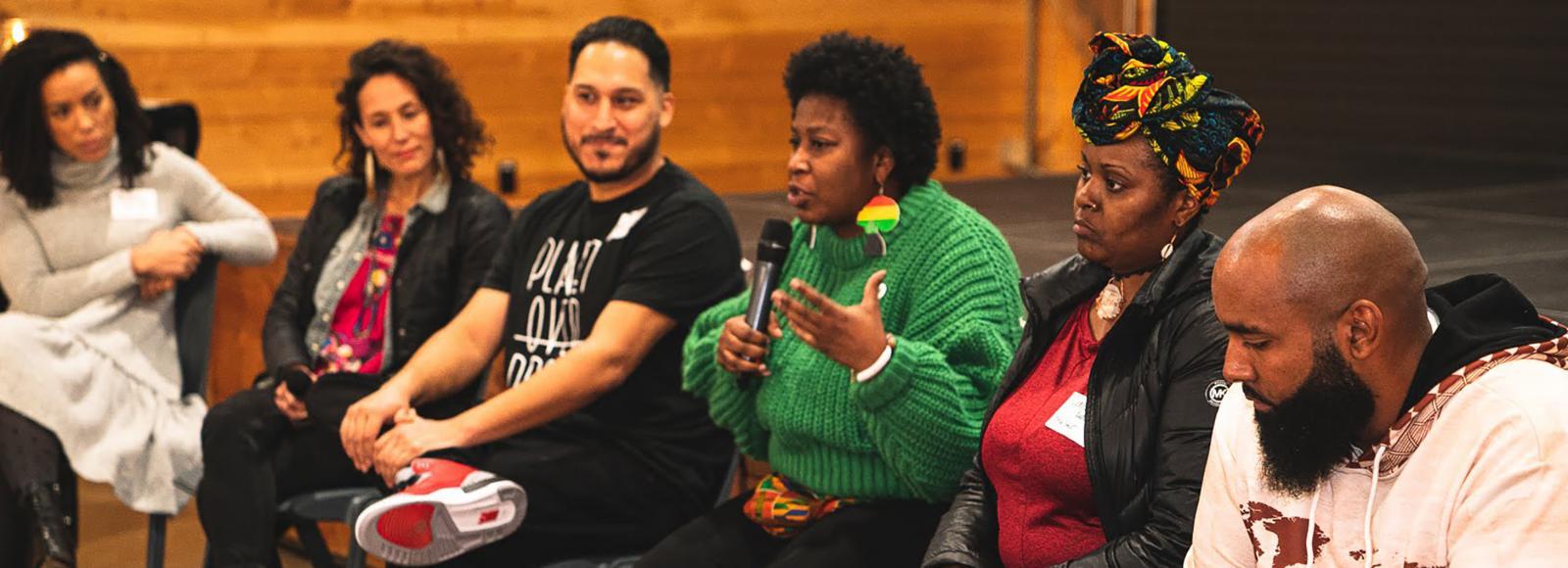
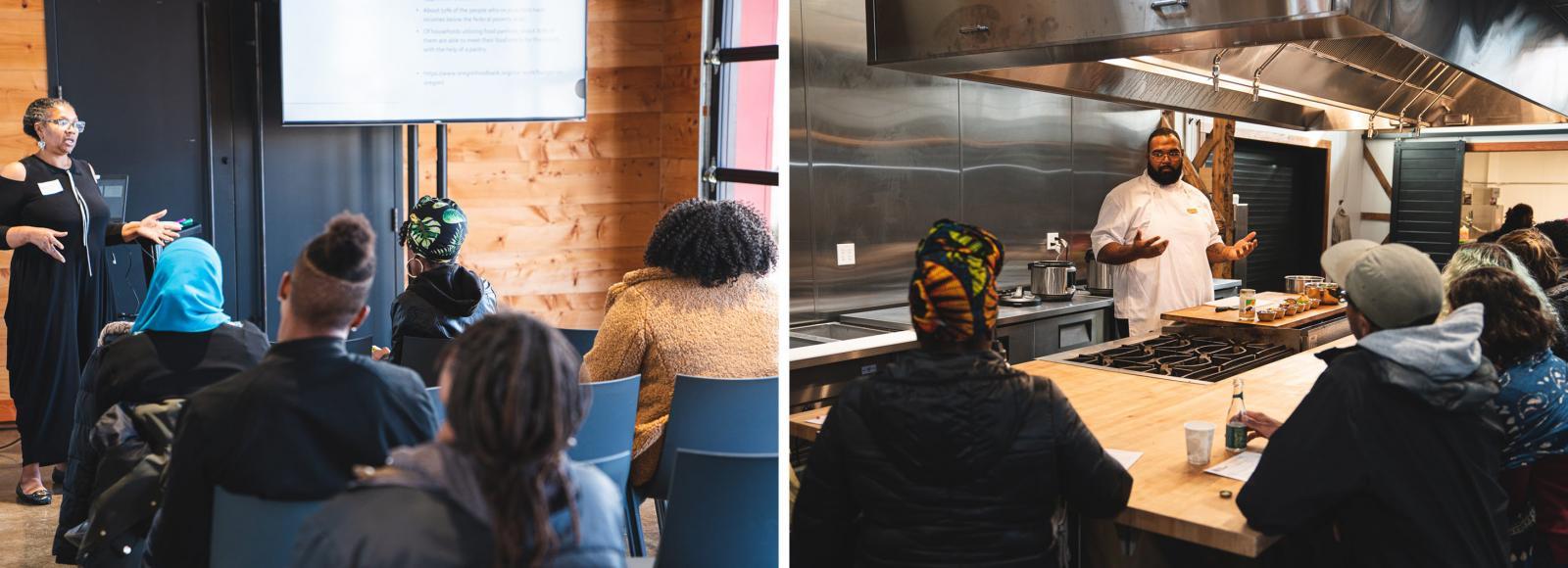
The Climate Justice panel, featuring Tanika Thompson of Got Green Seattle, Sam Baraso of the Portland Clean Energy Fund, Bill Beamer of the Portland Climate Action Team, Laquida Landford of Green In The Hood PDX, Janaira Ramirez of PAALF, and Michelle Week of Good Rain Farm, with one of the
Seed growing and keeping is critical to rebuilding resilient and equitable food systems. Over the last four decades, the seed industry has consolidated, and much of commercial seed is now owned and managed in the hands of a few transnational firms. Intellectual property practices (e.g., utility patents on seed) have stifled innovation in plant breeding and created barriers to improving the availability and integrity of organic seed. To build knowledge in this area, Micaela Colly of the Organic Seed Alliance, Melony Edwards of Ebony by Nature, and Adrianna Moreno of Empowered Flowers presented a workshop titled, “Seeds to our Roots.”
This workshop shared the immeasurable value of seed growing, including the empowerment of adapting crops to local climates, diversifying farm income, and enhancement of on-farm habitat. Presenters emphasized that while seed holds a link to our food histories and cultural ties, successful seed growing requires knowledge of seed biology, production practices and economics of the seed industry.
After a morning of inspiring workshops, Renard Turner of Vanguard Ranch delivered a powerful keynote address for the Back to the Root audience. Vanguard Ranch is a diversified farm business owned by husband-and-wife team Renard and Chinnette Turner. Located in Virginia, Vanguard maintains a herd of about 100 goats and grows seasonal produce on its 60 acres. Renard, a former Black Panther and educator, was featured in the 2015 book The Color of Food, as well as in articles in Civil Eats and Modern Farmer. Renard’s remarks focused on a theme of self-sufficiency and self-determination for Black farmers and ranchers. After the keynote, Malcolm Shabazz Hoover of Black Futures Farm facilitated a thought-provoking Q&A session with Renard.
On the second day of Back to the Root, conference-goers fanned out across Portland to visit farm and food system projects, including Black Futures Farm, Wapato Island Farm, and Unity Farm. Some participants remained at the Redd to experience a hands-on hemp workshop guided by local hemp cultivator and consultant Travell Bradford of Momma Nature, LLC; an intriguing and informative mushroom and wild edibles workshop with Elan Hagens of Temptress Truffles; and an infrastructure and operations tour of Redd West co-led by Ecotrust and New Seasons.


The Climate Justice panel, featuring Tanika Thompson of Got Green Seattle, Sam Baraso of the Portland Clean Energy Fund, Bill Beamer of the Portland Climate Action Team, Laquida Landford of Green In The Hood PDX, Janaira Ramirez of PAALF, and Michelle Week of Good Rain Farm, with one of the
Back to the Root 2020 was a powerful opportunity for BIPOC farmers, ranchers, educators, and advocates to gather, network, discuss experiences, build strategies, and learn about our history and our opportunities. Back to the Root 2020 also served as an introduction, orientation, and call for participation in the annual OSU Small Farms Conference held the next day on Saturday, February 22. Early Saturday morning, Back to the Root participants piled onto a bus sponsored by OSU, and headed to Corvallis, Ore., to attend detailed technical workshops on soil science, producer skills improvement, market development, and farming infrastructure.
Three weeks after Back to the Root, the region and then the nation went on lockdown as the COVID-19 pandemic swept through the globe. The pandemic, which caused major disruptions to food supply chains across the nation and world, further exposed the fragility and inequities of a global food system. The past several months have demonstrated that regional, decentralized, regenerative, and community-rooted food systems are actually more resilient to shocks and stressors and better positioned to bolster communities’ access to healthy, fresh, affordable food, even as conditions continue to worsen. And during this time, many of the regional BIPOC farmers and food systems leaders who participated in Back to the Root 2020 pivoted quickly to fill the gaps created by the pandemic: providing meals to those in need, launching and accelerating food sovereignty efforts, and creating new applied regional food system innovations.
As people across the country continue to hit the streets to mobilize for Black lives, we are seeing unprecedented materials, resources, and funds being shifted to match the power that continues to be built by BIPOC farmers and food systems leaders, people with lived experience who are closest to the problems and best positioned to shape solutions. Back to the Root and the events of the last months have made it even more clear: we must continue to embrace the new paradigm, harness the power of people’s lived experiences, use money as medicine, and directly invest in BIPOC-led food systems transformation to provide a model for what regional food economies can achieve when centered in racial justice and reflective of the people driving the shift.

PARTNER WEBSITE
Back to the Root is a PNW regional conference led by and for African and Black- identified farmers, ranchers, urban growers & gardeners, food producers, entrepreneurs, educators, and advocates.

PARTNER WEBSITE

PARTNER WEBSITE